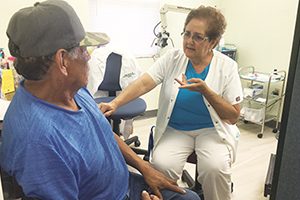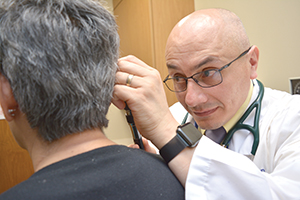Many middle age immigrants without legal status have untreated chronic illnesses; few have insurance
By JULIE MINDA
Dr. Stephen Stabile has noticed a subtle but telling shift in the demographics of the undocumented patients seeking care at PrimeCare Community Health, the Chicago-area federally qualified health center he heads.
Just a decade ago, medical staff in the clinic system treated mostly mothers and their children. "Now we're definitely serving an older population, and we're seeing more men than in the past. And the people we're seeing have more significant chronic health and behavioral health issues."

Nurse Marlene Rivera talks with a patient at the San Jose Mission Clinic in Dover, Fla., a free clinic run by Catholic Charities of the Diocese of St. Petersburg. Many of its patients are migrants, who do low-wage work in agriculture or aquaculture. Rivera, a faith community nurse for Tampa's St. Joseph's Hospital, is assigned to the clinic.
Chicago's Presence Saints Mary and Elizabeth Medical Center helped found PrimeCare, and two of the primary care clinics are located on the medical center's campuses.
Administrators and providers at ministry-owned or affiliated safety net clinics around the country report they're seeing a slight increase over time in the number of adult, undocumented immigrants seeking care for untreated chronic conditions. Most of those seeking care have no insurance.
Some of the safety net providers say the escalating health needs of aging immigrants could foreshadow looming challenges, especially for the millions of medically underserved immigrants who have lived in the U.S. without legal immigration status for decades. Poor health status could reduce the quality of their lives.
Among those concerned is Sr. Maria Luisa Vera, RSM, president of Mercy Ministries of Laredo, Texas. She says, "For some of these older adults, as they are aging, they will get to the point where they can no longer work. For many of them, if there is no work, there is no income, and so they will have nothing.
"I don't know what they will do, but it won't be a pretty picture," she says.
Sr. Vera and other safety net providers say people without legal status and without financial means have been doing without the care they need because of barriers they experience accessing the nation's health care system. These providers say they are looking for ways to reach this vulnerable population and engage them in preventive health care and chronic care management.
Undocumented, uninsured
In a January article, "Aging undocumented immigrants pose costly health care challenge," CNN Money cites Migration Policy Institute statistics that about 1.1 million of people in the U.S. without legal immigration status are age 55 and older; and as many as 71 percent of all adults in the U.S. without legal authorization are uninsured.
The Affordable Care Act excludes coverage on the exchanges or under Medicaid expansion for immigrants who lack legal status. Those individuals almost never qualify for health coverage through Medicare. Los Angeles Times and The Washington Times articles say some undocumented immigrants may qualify for Medicare Part D drug benefits, student health plans, employer-based insurance or limited state and local coverage plans. Some immigrants can afford private insurance. But for most immigrants without legal immigration status, there are few viable, long-term coverage options.
Without insurance, many don't seek care because of the expense, says Sr. Rosanne Popp, CCVI, a physician and director of the CHRISTUS St. Mary's Clinic in Houston. Sr. Popp says the majority of people without legal status who seek care at her clinic are in their 40s, 50s and 60s and they are beginning to show evidence of preexisting health problems that have gone unaddressed.
Adds Sr. Vera of Laredo: "People are living with untreated conditions until they become almost unmanageable before seeking care."
There are multiple barriers to care access; some are cultural. Sr. Sara Proctor, DW, is program coordinator for the free clinics of Catholic Charities of the Diocese of St. Petersburg. She says many first-generation Hispanic immigrants are unaccustomed to preventive care and health screenings. They seek care only when they feel sick, yet many chronic conditions are asymptomatic initially. Conditions like prediabetes or high blood pressure can go undetected until damage has occurred.
Chicago's Stabile adds that some immigrants lacking legal status "are fearful of coming (to our clinics), especially since we receive federal funding. They're intimidated and fearful of ICE raids." He says the clinics do not share patient information with the U.S. Department of Homeland Security's Immigration and Customs Enforcement division. While ICE has a policy to avoid enforcing immigration law at sensitive locations, including health care facilities, in most cases, the clinic experts who spoke to Catholic Health World say undocumented immigrants remain wary.
Sr. Popp in Houston says that while federally qualified health centers and other safety net clinics do provide care to people without legal immigration status, many of those sites in her community are overloaded and have long wait times. Plus, while those FQHCs do not require proof of citizenship, they do require other documentation, such as proof of residency, a statement on income and some form of identification. Such documents can be difficult for people without legal immigration status to obtain and can be a barrier to care access. Sr. Popp's clinic does not require such documentation.
Wear and tear
Aura Silva is manager of CARE, the case management, immigrant advocacy, resources and education network connected with St. Joseph Health Queen of the Valley in Napa, Calif. Its case managers direct immigrants to clinics and other locations where they can access care. Silva says many of CARE's clients have knee, hip, back and other orthopedic injuries related to heavy, physical labor.
She and the other safety net providers who spoke to Catholic Health World say their clinics treat significant numbers of immigrants without legal status who have high cholesterol, hypertension, diabetes and anemia.
Stabile adds that behavioral health concerns also are common. It is usual for undocumented immigrants to live and work in unhealthy situations — many have multiple jobs; work long hours in physically demanding jobs, and have long commutes using public transit. "It's clear the type of work they are doing is very detrimental to their health," he says.
Complex concerns
Dr. Wolfgang Rodriguez practices at a CHI Health safety net clinic in Omaha, Neb., that cares for low-income immigrants, including people without legal status. He says patients are presenting with conditions that have progressed to the point that treatment may be expensive and difficult to recover from.

Dr. Wolfgang Rodriguez examines a patient at a CHI Health clinic in Omaha, Neb. Many of the clinic's patients are vulnerable immigrants who have had little to no regular preventative care for much of their lives and now seek treatment for complex conditions.
The safety net facilities and services in this story have commonalities in the tactics they are employing to get upstream of chronic conditions in the immigrant community. The efforts aim to build trust, and to improve access to — and use of — health screenings and preventive care.
The facilities are building relationships within immigrant communities. They are leveraging partnerships with health care and social service providers to help immigrants with food, housing, transportation and other essential needs. They are providing navigators to help people access medical services.
Anticipating issues
The safety net providers use grants, charity care funds, partner organization relationships, volunteers and creativity to help ensure they meet the needs of these vulnerable patients. Even so, uninsured patients who require complex surgeries including organ transplants, dialysis or other costly procedures may have little recourse, a reality that makes prevention and disease management all the more essential.
Marisue Garganta, director of community health integration and community benefit for Dignity Health St. Joseph's Hospital and Medical Center in Phoenix, says some patients decide to return to their home country, where they find it easier to access medical care.
But that is not always an option. Garganta says many immigrants without legal status "become homeless, especially in their older years. Many of them have been here for 10, 20, 30 years and no longer have family or documents from their country, leaving them to now have 'no country' but the one they now call home — the U.S."
Copyright © 2018 by the Catholic Health Association
of the United States
For reprint permission, contact Betty Crosby or call (314) 253-3490.